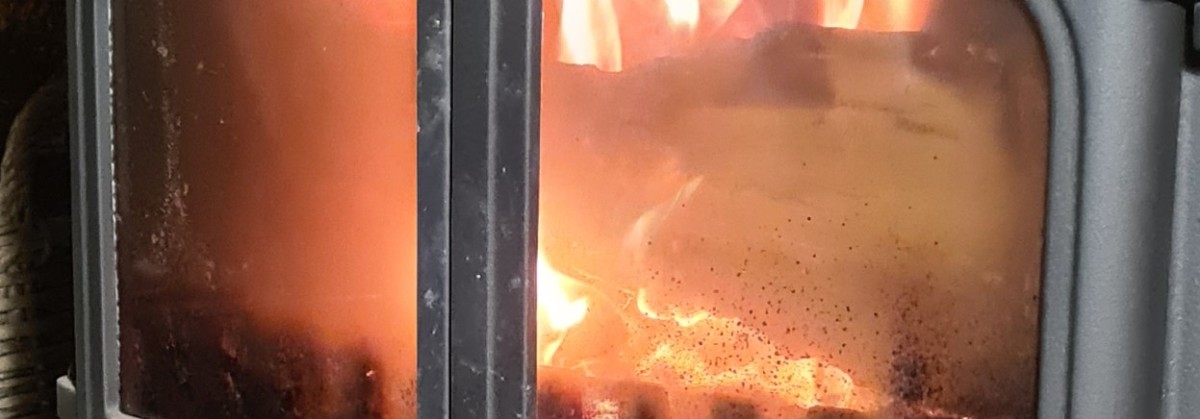George Monbiot, an influential writer on enviroment and climate, made a grovelling apology in the Guardian not long ago. It wasn’t for any mistake in the paper, but for having personally owned three wood-burning stoves for the last 14 years, which he’d decided was a terrible error. Not only do they produce large amounts of carbon dioxide, they also spew out dangerously polluting particles.
So while I’ve been chopping wood for the winter, I’ve been worrying about our woodburning stove, which we installed in 2009. Are we poisoning ourselves and others, and damaging the planet into the bargain?

Now you could say that with 3 stoves for 14 years Monbiot has had 42 warm stove years against our modest 14 since 2009. He’s pulling up the ladder behind him, so we don’t need to feel bad about it. It will be another 28 years before we’ve done as much damage as him.
You could also look back 15 to 20 years and find a lot of climate conscious people promoting the idea that wood is a good source of heat because it is renewable. Those who have had wood burners for a long time installed them in good faith, and are entitled to feel a bit aggrieved when the advice reverses (just like the advice to buy diesel cars for the sake of the planet, which was also suddenly reversed).
Enthusiasm for wood burning led to some serious mistakes, both in the installation of thousands of wood chip boilers in the home and also in government policy: converting the huge Drax coal power station to wood burning has turned out the opposite of a climate friendly policy.
Monbiot’s case against wood-burning stoves is that though they are owned by only 7 or 8 per cent of Britons they create more dangerous pollution than all the cars on the road, and carbon dioxide emissions from stoves are contributing to the climate crisis.
Much of the wood burned is said to come from unsustainable sources and sometimes from trees that are unnecessarily felled for profit. The time had come to own up after years of keeping his ownership quiet, Monbiot said, in what read as an overwhelming rush of guilt.
What are we going to do? Nothing. Here’s why:
The house is built from timber and clay and has never been heated by anything other than burning wood. We decided when we repaired it to stick with the original heating, replacing an open fire by putting the most powerful domestic wood burner we could find into the large brick fireplace. (At some earlier stage the building had also been a brewhouse with a central hearth).
This was a much better solution than the usual plan with houses off the gas grid, of installing an oil or gas tank outside and a full wet central heating system. That would dry out the whole building, in a way which we suspected could be potentially damaging.
We did not want to give up entirely on modern standards of heating so the compromise was to install individual electric radiators. Other than the wood burner we are entirely electric, but the wood burner allowed us to keep the electricity bills well down until the 2022 fuel crisis.
We have now decided to switch the emphasis more towards off-peak storage heaters to take advantage of the much increased differential between night and day rates. We have just added two really big ones. We also signed years ago with an electricity supplier that has most of its contracts with renewables – wind, solar and nuclear.
By avoiding direct burning of oil or gas and focusing on the combination of electricity and wood burning I think we’ve found a better solution than ditching our wood burner in guilty panic like Monbiot.
What about the health risks? We are in a small hamlet of a few houses surrounded by fields, so it’s not like a wood stove in town sending clouds of particles over nearby streets. There are miles of largely open country in which it can disperse.
And the risks to our health? We use dry hardwood, which produces very little smoke. It’s definitely not harvested unnecessairily – we have had a lot of dead and dying ash in the garden, and it is 11 years since we have had to buy firewood. We have planted more new trees than we have had to fell.
Good ventilation is an absolute necessity for wood burning and a closed stove produces far fewer pollutants than an open fire. Care has to be taken not to inhale fumes when lighting and refuelling but otherwise we are minimising the risks as much as we can. Also, the stove is usually lit only in the evenings in winter, and the heat in the fireplace bricks stores warmth that lasts well after the fire has gone out around midnight.
So put it this way: I don’t think we’ll ever get to the point of doing as much damage as Monbiot has with his three woodburners.
